Best Tools for Remote Job Keyword Optimization
Optimize your resume for remote jobs with the best tools that help you navigate ATS systems and increase your chances of landing interviews.
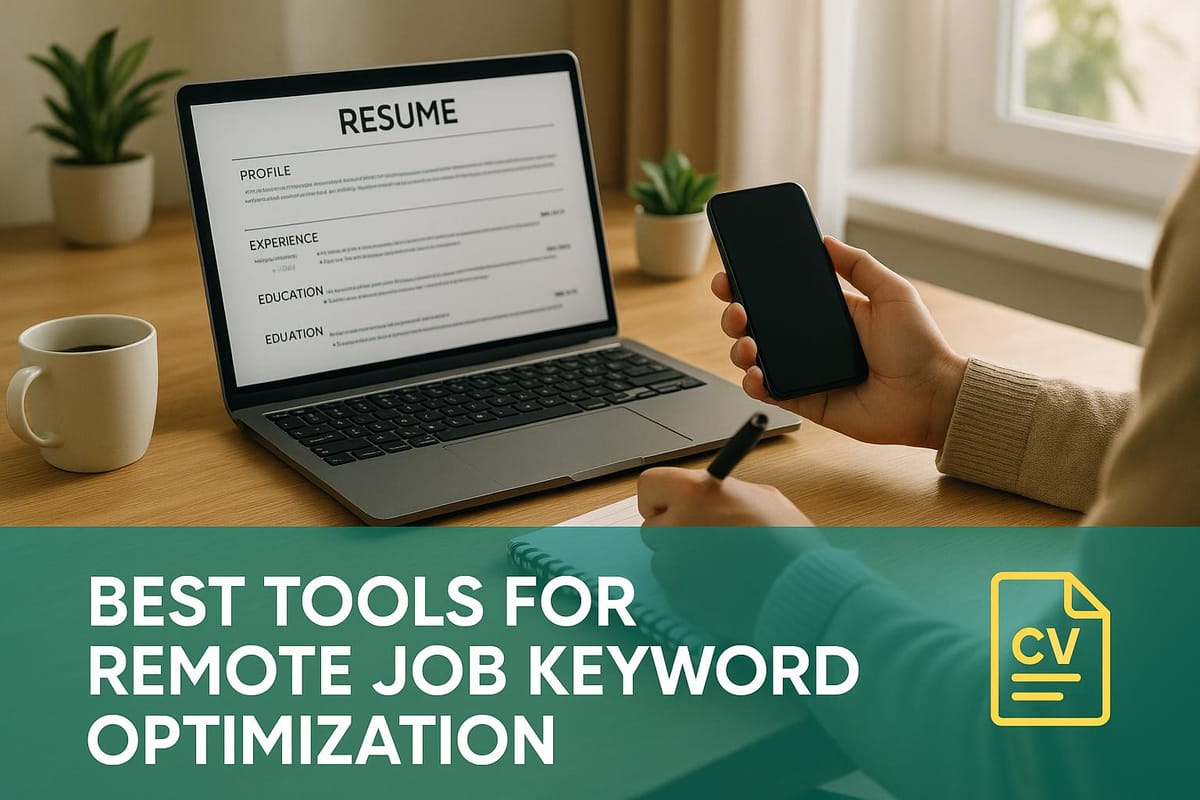
Want to land a remote job? Keyword optimization is the key to getting your resume past Applicant Tracking Systems (ATS). Remote jobs attract a flood of applicants, and ATS software filters resumes based on specific keywords. Without them, even qualified candidates risk rejection.
Here’s what you need to know:
- Keywords Matter: Use exact terms from job descriptions (e.g., "Python" instead of "programming languages"). Include remote-specific skills like "time management" and "virtual collaboration."
- Common Mistakes: Avoid generic resumes, misaligned terms, or ignoring location-based keywords like "EST" or "remote."
- Top Tools: Platforms like scale.jobs, Jobscan, and Teal help optimize resumes. Some offer AI support, while others provide human assistance for tailored applications.
- Best Choice: Scale.jobs combines AI and human services, offering tailored resumes, job tracking, and visa-specific expertise for as low as $9/month.
Quick Comparison:
| Tool | Cost | Features | Human Support | Best For |
|---|---|---|---|---|
| scale.jobs | Free-$199+ | AI + Human, ATS-ready, job tracking | ✅ Yes | Remote jobs, visa challenges |
| Jobscan | $49.95-$99.95 | ATS matching, keyword analysis | ❌ No | DIY keyword optimization |
| Teal | Free-$19 | LinkedIn integration, basic tools | ❌ No | LinkedIn-focused searches |
| Rezi | $29 | AI resume builder, templates | ❌ No | Simple ATS-ready resumes |
| LazyApply | $99+ | Automated mass applications | ❌ No | High-volume applications |
To stand out, start with AI-powered tools like scale.jobs for quick customization. For critical applications or visa-specific needs, human assistance ensures precision. Tailoring your resume with the right tools can increase your chances of landing interviews by up to 50%.
How Do Remote Resume Keywords Get You Hired? - Guide To Work From Home
How to Choose the Best Keyword Optimization Tools
Selecting the right keyword optimization tool can significantly impact your remote job search. With so many options available, each claiming to improve your success with Applicant Tracking Systems (ATS), it’s crucial to focus on tools that genuinely enhance ATS compatibility.
Keep in mind, a higher price tag doesn’t always mean better quality. Some costly tools might highlight flashy features while neglecting the essentials that truly make a difference.
Here’s what to look for when evaluating keyword optimization tools for remote job applications.
Must-Have Features for Keyword Optimization
- ATS Compatibility Testing: Ensure the tool checks compatibility with specific systems like Workday, Greenhouse, or Lever. Many tools claim ATS readiness but only test against generic platforms, which may not be sufficient.
- Job Description Analysis and Match Scoring: Look for tools that provide detailed match scores, breaking down alignment by categories such as hard skills, soft skills, and remote-related terms. This helps you understand exactly how your resume stacks up against job postings.
- Industry-Specific Keyword Databases: A robust keyword database is vital, especially for remote roles. It should include terms like "asynchronous communication", "distributed team management", and "virtual collaboration tools" to ensure your resume speaks the language of remote work.
- Bulk Resume Customization: Applying to multiple jobs? Tools that allow you to quickly create tailored resume variations for different roles or companies can save you hours of manual editing.
- Integration with Job Boards: Look for tools that connect directly with platforms like LinkedIn, Indeed, or company career pages. This integration simplifies the process by pulling job descriptions and providing optimization suggestions.
- Progress Tracking and Application Management: The best tools combine keyword optimization with tracking features, helping you stay organized. They can even show which resumes performed best, making it easier to refine your strategy.
Software vs AI vs Human Help: What Works Best
When it comes to keyword optimization, there are three main approaches: automated software, AI-powered platforms, and human assistance. Each has its strengths and limitations.
- Automated Software Tools: These tools are fast and consistent, capable of scanning hundreds of job descriptions in minutes. However, they often lack the ability to grasp context, such as distinguishing between "Python" and the more specific "Python 3.9+." They work best for high-volume applications and typically cost between $10 and $50 per month.
- AI-Powered Platforms: AI tools strike a balance between speed and intelligence. They can recognize context and variations, such as understanding that "React.js" and "ReactJS" are equivalent. AI platforms like scale.jobs can even generate tailored resumes and cover letters with a single click, aligning your content to specific job requirements. Starting at $9 per month, these platforms are particularly useful for those applying to dozens of positions weekly.
- Human Assistance: For the highest level of precision, professional resume writers and reverse recruiters are unmatched. They understand industry-specific nuances and can tailor your application to highlight key details that automated tools might overlook, such as emphasizing "startup experience" over "enterprise background" when relevant. For example, scale.jobs offers a human assistant service that handles the entire application process for a flat fee starting at $199 for up to 250 applications. Their service includes real-time updates via WhatsApp and proof-of-work screenshots, ensuring transparency while saving you over 20 hours per week.
- Hybrid Approaches: Combining AI tools with human oversight often delivers the best results. AI handles the initial optimization, while human experts refine high-priority applications or step in when automated methods fall short.
For most remote job seekers, starting with AI-powered tools for quick and efficient optimization is a smart move. When it comes to critical applications or improving interview rates, upgrading to human assistance can provide the extra edge.
In the next section, we’ll dive into specific tools like scale.jobs, Jobscan, Teal, Rezi, and LazyApply to see how they stack up against these criteria. Stay tuned!
Best Tools for Remote Job Keyword Optimization
Now that you’ve got a handle on what to look for in keyword optimization tools, let’s dive into some of the top platforms that can help supercharge your remote job search. Each tool brings something different to the table, from AI-driven features to hands-on human support.
scale.jobs
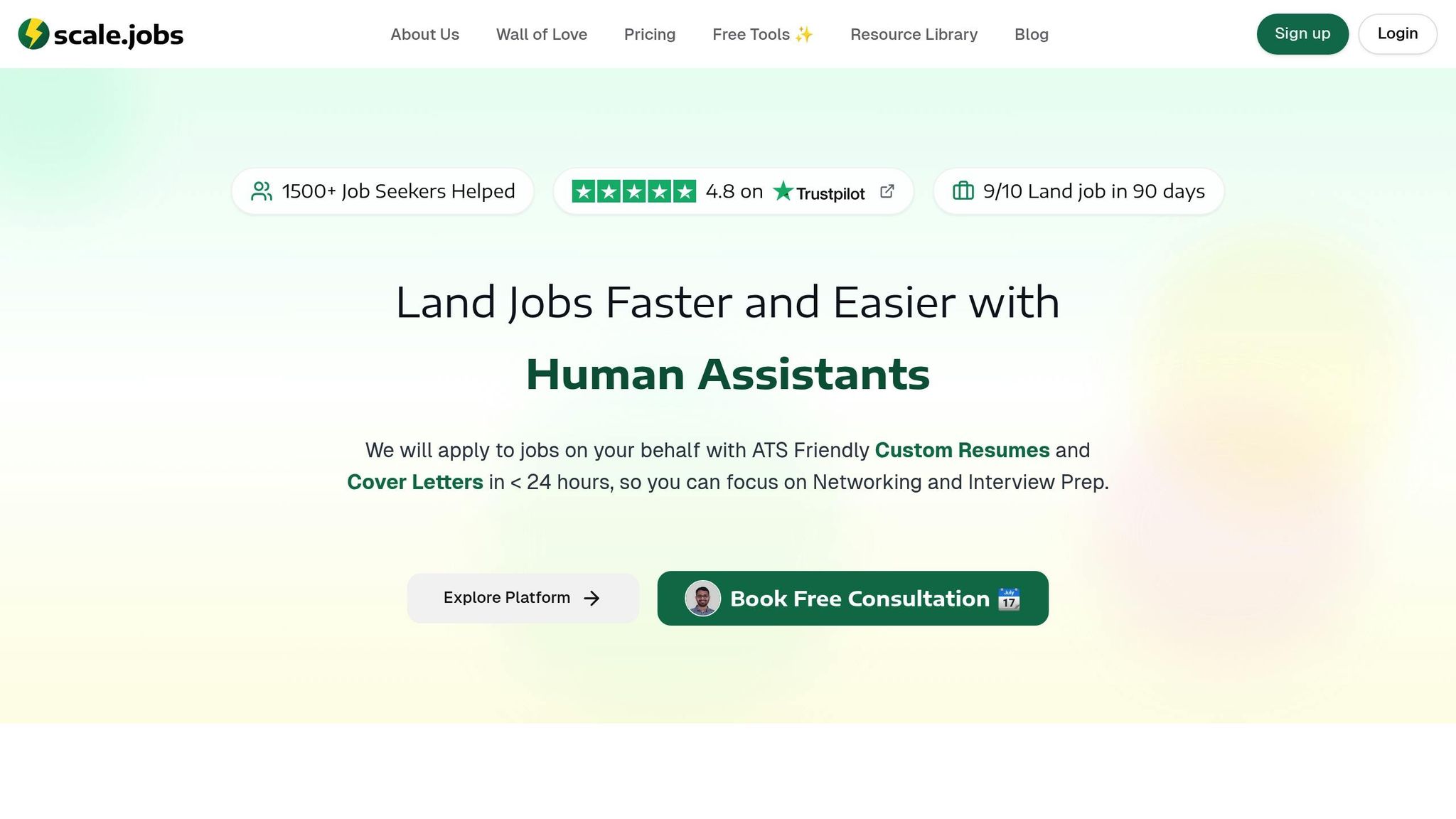
scale.jobs is a standout platform because it combines free software, AI tools, and human services all in one place. Unlike other tools that focus on just one aspect, scale.jobs covers everything you need for remote job keyword optimization.
The platform offers a three-tier structure, allowing you to pick the level of support that suits you best. Here’s what you can expect:
- The free tier includes an ATS-compliant resume builder, a job application tracker, and access to over 2 million job listings every month.
- For $9/month (launch pricing), the AI Assistant Pro generates unlimited tailored resumes and cover letters with just one click.
- Their Human Assistant service starts at $199 for 250 applications. Real human assistants manually handle your job applications, ensuring they avoid bot flags. Plus, you’ll get real-time updates via WhatsApp and proof-of-work screenshots.
Why scale.jobs stands out:
- Flat-fee pricing avoids the trap of recurring subscription costs.
- Fast turnaround - tailored resumes and cover letters are ready within 24 hours.
- Works seamlessly with corporate ATS systems and niche job boards.
- Human-powered applications help you avoid automated rejections.
- Comes with extra tools like a salary predictor, interview question predictor, and portfolio generator.
This platform is particularly helpful for visa-dependent job seekers (H1B, F1, CPT, TN, O1) and recent grads, addressing challenges that other tools often overlook. Next, let’s see how competitors like Jobscan stack up against this comprehensive approach.
Jobscan
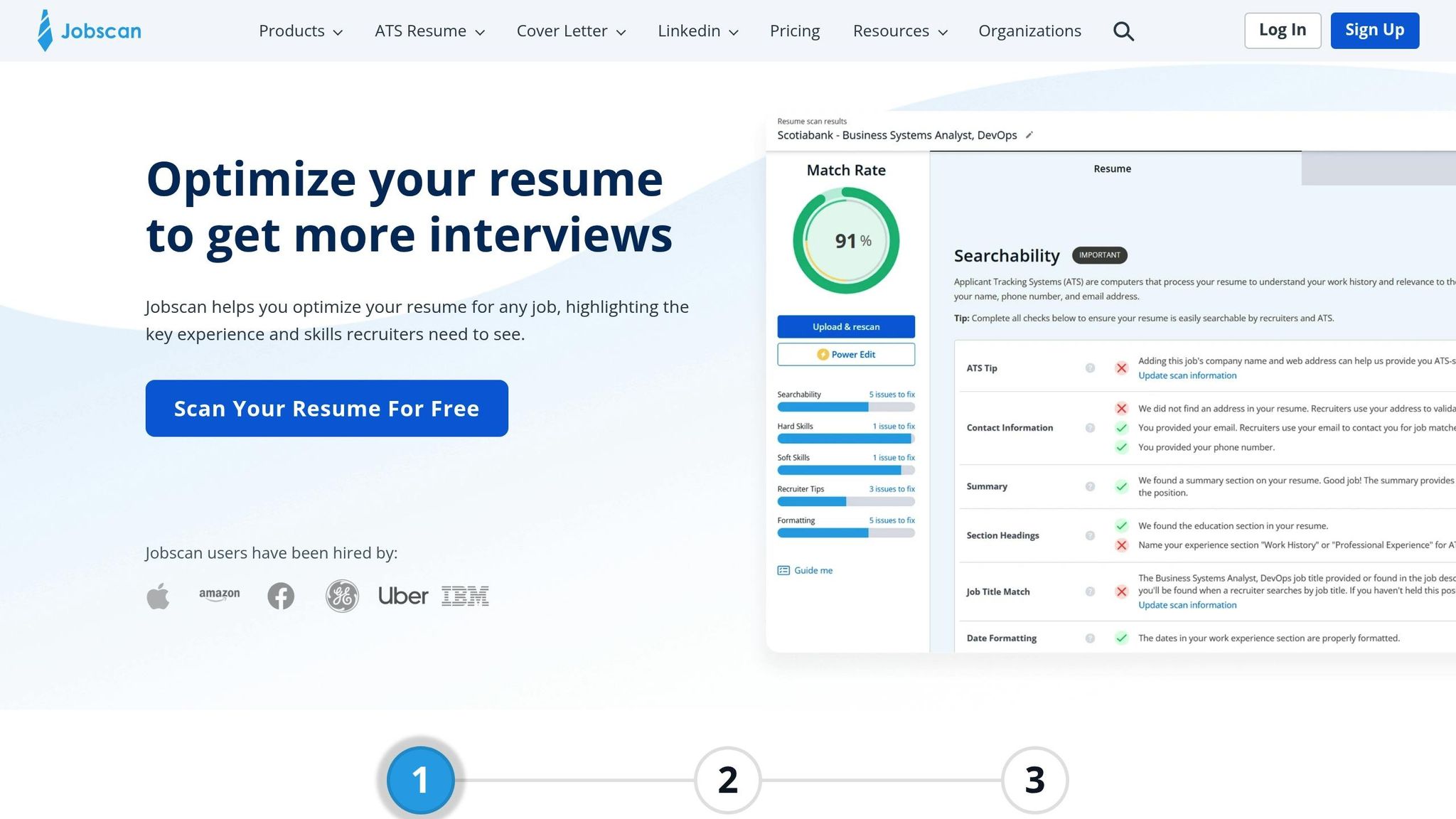
Jobscan specializes in ATS keyword matching and resume optimization. It analyzes your resume against job descriptions to provide match scores, keyword density insights, and suggestions for improving compatibility with systems like Workday, Greenhouse, and Lever.
However, Jobscan has clear limitations. It requires you to manually edit your resume for every application and doesn’t offer tracking features or human assistance for more complex scenarios.
Pricing starts at $49.95/month, with premium plans reaching $99.95/month. For long job searches, these recurring costs can add up quickly. While Jobscan excels in its niche, it lacks the broader support needed for a competitive remote job market.
Teal
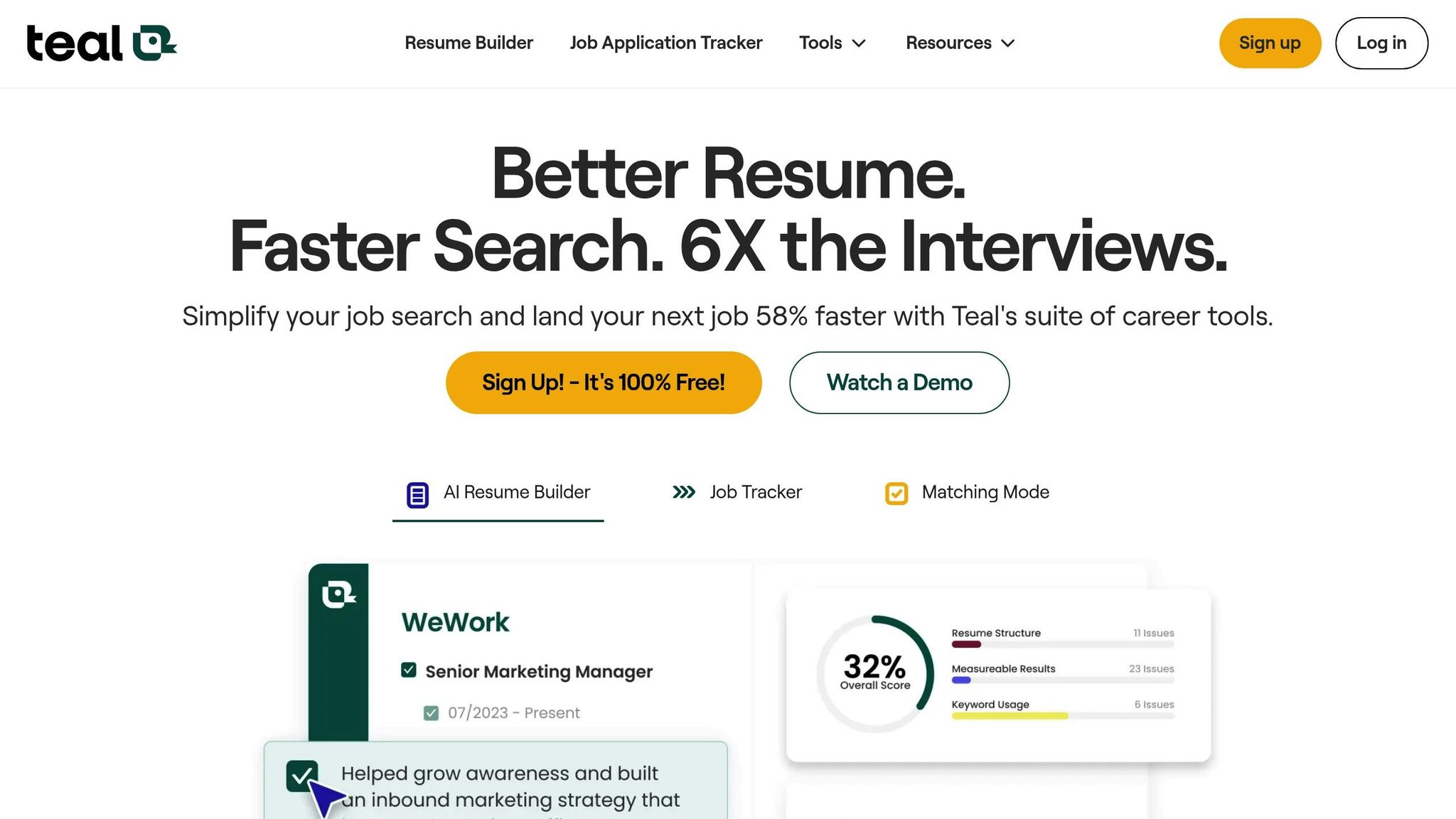
Teal blends AI-powered resume building with LinkedIn integration and keyword optimization tools. It analyzes your resume and provides match scores to help you fine-tune your applications.
One of its strengths is LinkedIn integration, which pulls your profile data to create resumes. Teal also includes job tracking and basic application management features.
That said, Teal leans heavily on software and lacks human expertise for more nuanced optimization. It struggles with industry-specific language and the unique needs of remote job seekers. Pricing ranges from free for basic features to $19/month for premium access, making it a mid-tier option that sacrifices the deeper customization human input can provide.
Rezi
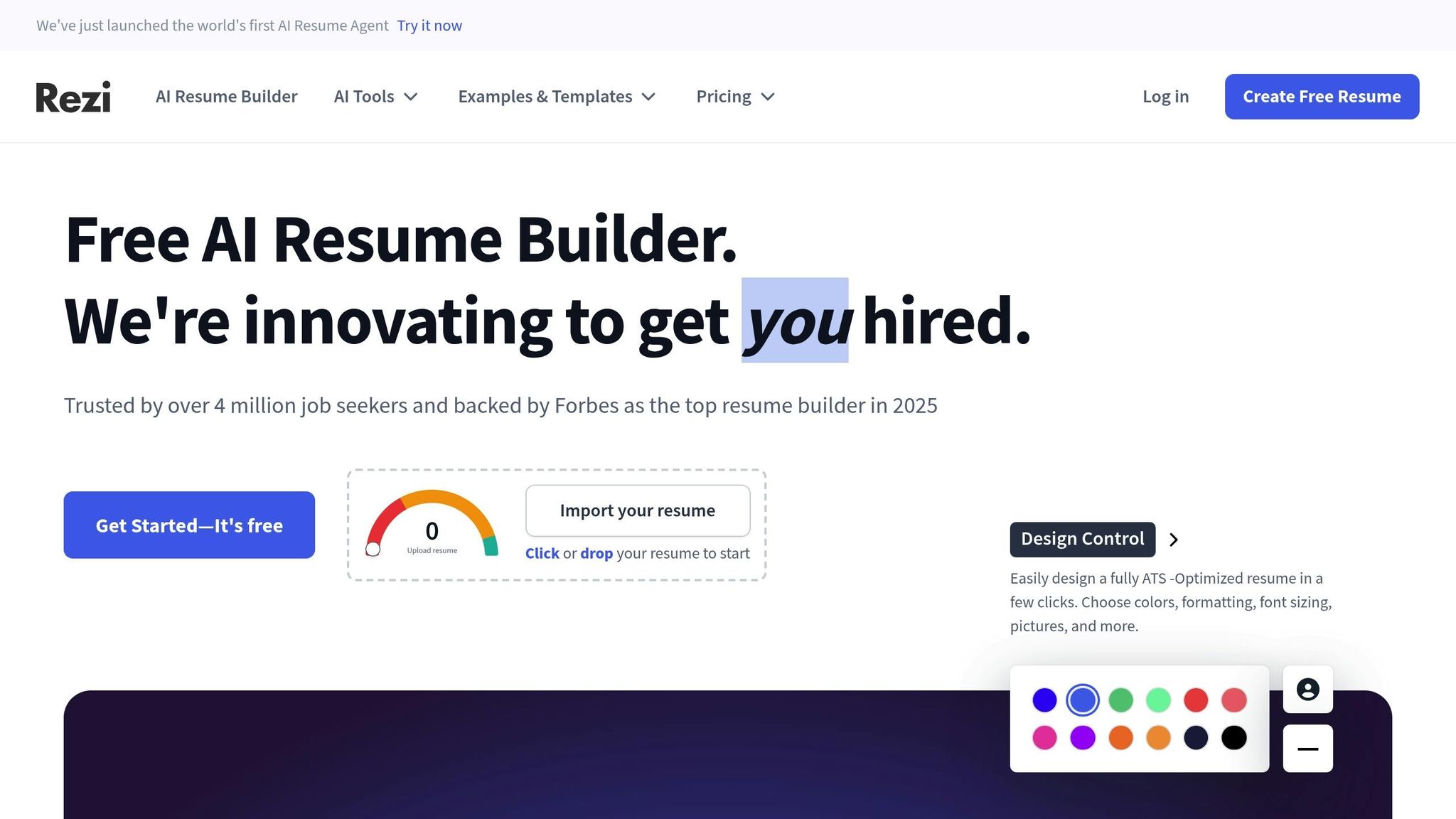
Rezi markets itself as an AI-driven resume builder optimized for ATS systems. It uses artificial intelligence to suggest improvements and offers real-time optimization scores as you edit your resume. The platform even has templates tailored for remote work applications.
However, Rezi’s AI-only approach doesn’t match the flexibility and insight that human experts bring. It’s less effective for addressing industry-specific requirements or visa-related challenges, which are common in remote job searches. At $29/month, it’s pricier than some AI-assisted options while offering fewer features overall.
LazyApply
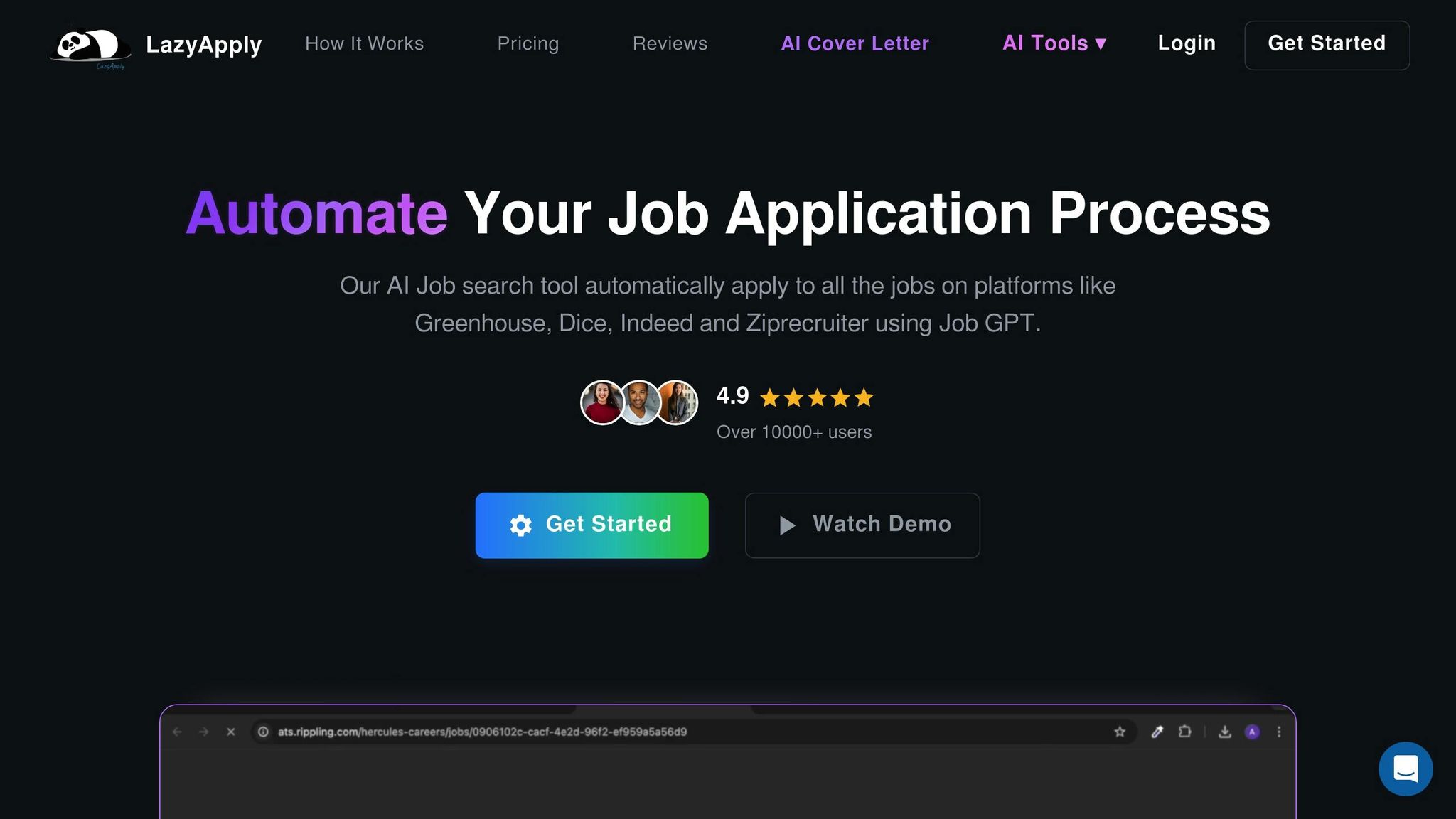
LazyApply takes an automation-first approach, focusing on inserting keywords and applying to large numbers of jobs automatically. It’s ideal for job seekers looking to quickly apply to hundreds of positions.
The tool customizes applications with keywords from job descriptions and integrates with major job boards to speed up the process. However, LazyApply’s automated strategy comes with risks. Many companies now detect and reject bot-submitted applications, which could harm your reputation with employers. It also lacks the personal touch needed for competitive remote roles.
Pricing starts at $99/month, making it a costly option for what is essentially automated mass applications without the quality assurance of human expertise.
Ultimately, the right tool depends on your specific needs, budget, and the level of support you’re looking for. While platforms like Jobscan and Teal excel in focused areas, scale.jobs offers the all-in-one flexibility and human touch that can make a real difference in today’s competitive remote job market.
Tool Comparison: Features and Pricing
What We Compared
When evaluating keyword optimization tools for remote job searches, we focused on five key areas that directly influence your success. These criteria helped us identify which platforms genuinely improve your chances of landing a remote job.
Keyword optimization capabilities were our primary focus. We tested how effectively each tool identifies relevant keywords from job descriptions, suggests improvements, and assesses ATS (Applicant Tracking System) compatibility. The best tools don’t just highlight missing keywords - they also provide actionable advice on how to incorporate them.
AI versus human support stood out as a critical factor. While AI tools process data quickly, human expertise is invaluable for tackling nuanced industry jargon, visa-specific applications, and complex remote work scenarios. We evaluated response times, accuracy, and how well each platform customized its services.
ATS compatibility is essential to ensure your application actually gets seen by recruiters. We tested each tool against major ATS platforms like Workday, Greenhouse, Lever, and Taleo to see how well they handled formatting, keyword density, and file compatibility - common reasons for application rejections.
Additional features and integrations were also considered. The most effective platforms bring together keyword optimization, job tracking, and networking tools to create a seamless job search experience.
Here’s a side-by-side comparison that breaks down these criteria into clear differences.
Side-by-Side Comparison
| Tool | Monthly Cost | Keyword Features | Human Support | ATS Compatibility | Best For |
|---|---|---|---|---|---|
| scale.jobs | Free - $19 + flat-fee human services | AI keyword optimization + human review | ✅ Trained VAs handle applications | ✅ Works with all major ATS systems | Comprehensive job search with human touch |
| Jobscan | $49.95 - $99.95 | Advanced ATS matching scores | ❌ Software only | ✅ Excellent ATS analysis | DIY keyword optimization |
| Teal | Free - $19 | Basic keyword suggestions | ❌ AI assistance only | ✅ Good ATS compatibility | LinkedIn-integrated job search |
| Rezi | $29 | Real-time optimization scores | ❌ AI-driven only | ✅ Strong ATS optimization | Template-based resume building |
| LazyApply | $99+ | Automated keyword insertion | ❌ Fully automated | ⚠️ Increased bot detection by employers | High-volume applications |
Key Insights
Cost Differences: Pricing varies widely depending on the platform. For instance, a six-month premium plan with Jobscan costs $599.70, while LazyApply totals $594 or more. In contrast, scale.jobs offers its AI Assistant Pro at $114 for six months, with optional human services starting at $199 for 250 applications.
Feature Depth: scale.jobs stands out by offering a three-tier structure that includes free tools, unlimited AI-generated resumes and cover letters, and optional human assistance. This flexibility allows users to start at no cost and expand their investment as needed.
Human Support vs. Automation: Unlike platforms that rely solely on AI, scale.jobs employs trained virtual assistants for manual application handling. This approach avoids the bot detection issues associated with fully automated tools like LazyApply. Additionally, scale.jobs provides real-time WhatsApp updates and proof-of-work screenshots for complete transparency.
Turnaround Times: Processing speed varies significantly. Jobscan and Teal require manual edits for each application, which can be time-consuming. Rezi speeds things up with AI but still demands user input. scale.jobs, however, delivers customized documents within 24 hours via human assistants and offers instant options through AI.
Visa-Specific Expertise: For international job seekers, scale.jobs takes the lead by addressing visa-specific needs like H1B, F1, CPT, TN, and O1. Their human assistants understand the legal and linguistic nuances that automated tools often overlook, making them a strong choice for candidates navigating immigration complexities.
ROI Considerations: While LazyApply may submit hundreds of applications quickly, the risk of bot detection can harm your chances. On the other hand, scale.jobs’ human-powered approach, though slightly more expensive per application, ensures higher-quality submissions that bypass automated rejections. This balance of efficiency and precision offers better long-term value.
How to Use These Tools for Better Results
To get the most out of keyword tools, you need a thoughtful approach. Using these tools effectively can make the difference between landing interviews and facing rejection.
Step-by-Step Keyword Optimization Process
Here’s a practical way to optimize your resume for remote job applications:
Start by analyzing the job description. Look for recurring terms, especially in multiple sections. Remote job postings often highlight skills like "cross-functional collaboration", "asynchronous communication", and "self-directed work." These phrases carry more weight than generic ones like "team player."
Identify both hard skills (e.g., Python, Tableau) and soft skills (e.g., stakeholder management, data-driven decision making). Use the exact phrasing from the job description to align with automated tracking systems (ATS).
Run your resume through a keyword tool to get an initial score. Whether you’re using Jobscan’s percentage match or scale.jobs’ AI analysis, this baseline will help you track your progress. Note your score and any missing keywords.
Weave keywords naturally into your resume. Don’t just list them in a skills section. For example, if the job mentions "project management", integrate it into your experience: "Led cross-functional project management initiatives that improved efficiency by 15%." This approach ensures your resume appeals to both ATS and human recruiters.
Experiment with multiple versions of your resume for the same job posting. Even small tweaks can impact your ATS score. Tools like scale.jobs’ AI Assistant Pro allow unlimited resume testing, making this process easier than tools with daily limits.
Keep track of your applications. Use a spreadsheet to log the keyword strategies you’ve used, your ATS scores, and the responses you’ve received. This will help you identify which methods work best for your field and experience level.
Following these steps ensures your applications are tailored and optimized, leveraging the full potential of tools like scale.jobs.
When You Need Human Help
Sometimes, automated tools can only take you so far. That’s when human expertise becomes essential.
Visa-related applications often require precise language that AI tools might miss. For example, H1B-eligible roles need specific phrasing around sponsorship, while F1 students must carefully address CPT/OPT details. Services like scale.jobs’ human assistants understand these nuances and can adjust your applications accordingly - something automated tools like LazyApply struggle to handle.
Senior-level positions require a different approach to keyword optimization. For instance, a VP of Marketing resume needs to showcase leadership experience while maintaining keyword density, unlike an entry-level marketing coordinator application. Human reviewers excel at positioning executive-level experience effectively.
Career transitions can be tricky, especially when moving into a new industry. If you’re shifting from finance to tech or transitioning from in-person to remote work, human experts can identify transferable skills that AI systems often overlook.
Complex application portals can overwhelm automated tools. Platforms like Workday, SuccessFactors, and custom corporate portals have unique requirements for file uploads, forms, and additional questions. Human assistants from scale.jobs can manually handle these challenges to ensure proper submission.
High-priority applications deserve extra attention. If you’re applying for a dream job or a role with a significant salary increase, investing in a human review can pay off. Human experts bring a level of precision and strategy that automated tools can’t match.
When time is of the essence - such as after a layoff or with expiring work authorizations - human assistance ensures both speed and accuracy. If you’ve been using AI tools for weeks without meaningful results, or if your situation involves complexities beyond keyword matching, services like scale.jobs’ reverse recruiter approach can often provide the edge you need to move forward in your job search.
Choosing the Right Tool for Your Remote Job Search
When navigating the challenges of applicant tracking systems (ATS) and remote job searches, selecting the right tool can make all the difference. The key is to pick one that aligns with your specific needs. Each tool comes with its own set of features, so understanding what they offer is crucial.
For budget-conscious job seekers, free tools are a great starting point. Platforms like scale.jobs provide a free tier that includes access to job boards, basic application tracking, and AI-powered resume tailoring. Similarly, Teal offers essential features at no cost, making them ideal for those looking to save money.
Recent graduates and entry-level candidates often benefit from affordable AI-powered tools. For example, scale.jobs' AI Assistant Pro, priced at $9 per month, offers unlimited resume customization and cover letter generation. These tools are particularly effective for entry-level roles, where application requirements tend to be straightforward, allowing AI to handle most of the heavy lifting.
Visa-dependent job seekers face unique hurdles that automated tools may not address effectively. For individuals holding visas like H1B or F1, it's critical to include precise language about sponsorship and work authorization. This is where scale.jobs' human assistants excel - they understand the complexities of immigration and can craft tailored applications that meet these specific needs.
Senior professionals and career changers often require more nuanced strategies. Executive roles demand a strong emphasis on leadership experience, while career transitions rely on showcasing transferable skills. In these cases, human expertise can be invaluable. Scale.jobs offers reverse recruiter services priced between $199 and $399, depending on the number of applications you need, providing personalized support for these more complex scenarios.
The time factor is another critical consideration. If you're casually exploring opportunities while employed, DIY tools should suffice. But if you're dealing with a layoff or an upcoming work authorization deadline, speed becomes essential. Scale.jobs offers 24-hour turnaround services, ensuring your applications are processed quickly and accurately.
Your application volume also plays a role in choosing the right tool. For a targeted approach - applying to 10-20 carefully selected companies - premium AI tools may be enough. However, if you're submitting over 100 applications, scale.jobs' flat-fee model is more cost-effective compared to services that charge per application.
Some complex application portals, like Workday and SuccessFactors, require manual expertise to navigate effectively. Scale.jobs' human assistants are well-equipped to handle these challenges, ensuring your applications meet all the necessary requirements.
The numbers speak for themselves: 9 out of 10 scale.jobs users secure a job within 90 days, and 70% receive refunds after finding employment early. This success highlights the advantage of combining human expertise with ATS optimization, especially for job seekers with more intricate needs.
Ultimately, your decision comes down to the complexity of your job search. For simple keyword matching, AI tools can do the job. But for situations involving visa requirements, senior-level roles, or tight deadlines, human-powered services like scale.jobs offer the personalized support and expertise needed to stand out from the crowd.
FAQs
How can I make sure my resume is optimized for ATS when applying for remote jobs?
To make sure your resume passes through Applicant Tracking Systems (ATS) for remote job applications, focus on matching keywords from the job description. Incorporate relevant skills, job titles, and industry terms, using both their full forms and abbreviations to cover all bases.
Keep the format simple and ATS-friendly. Avoid using tables, graphics, or columns, as these can confuse the system. Stick to standard fonts like Arial or Times New Roman, and save your resume as a .docx file for compatibility.
If you need guidance, take advantage of free or AI-powered tools. They can help you fine-tune your resume to meet ATS standards and boost your chances of landing an interview.
What are the advantages of combining AI tools with human assistance for optimizing your resume?
Combining AI tools with human expertise creates a powerful strategy for optimizing resumes. AI tools excel at quickly aligning your resume with specific job descriptions, ensuring it passes ATS (Applicant Tracking System) checks and incorporates the right keywords. On the other hand, human professionals bring a personal touch, fine-tuning the tone and highlighting your unique skills and experiences.
This blend produces resumes that are both technically polished and genuinely engaging, increasing your chances of catching an employer's attention and securing interviews.
How can I choose the best keyword optimization tool for my job search needs and budget?
Choosing the best keyword optimization tool depends on what you're aiming to achieve in your job search and how much help you want along the way. Start by figuring out your priorities - whether it’s creating resumes that pass ATS (Applicant Tracking System) checks, crafting personalized applications, or getting full-service guidance.
scale.jobs is a standout option, offering a range of flexible tools. It provides free features, AI-powered capabilities like customized resumes and cover letters, and even human assistant services for more direct support. This makes it a great choice for those who want a balance between do-it-yourself tools and professional assistance.
If ATS optimization is your main concern, platforms like Jobscan or Rezi specialize in scanners and templates to boost your resume’s compatibility. On the other hand, if you’re looking for an all-in-one solution, platforms like Teal combine application tracking, resume building, and cover letter creation in one place.
Budget is another factor to keep in mind. Some tools are free, while others come with subscription fees or one-time costs. For instance, scale.jobs offers free software features alongside reasonably priced AI and human assistant services, making it a versatile option for a variety of needs.




